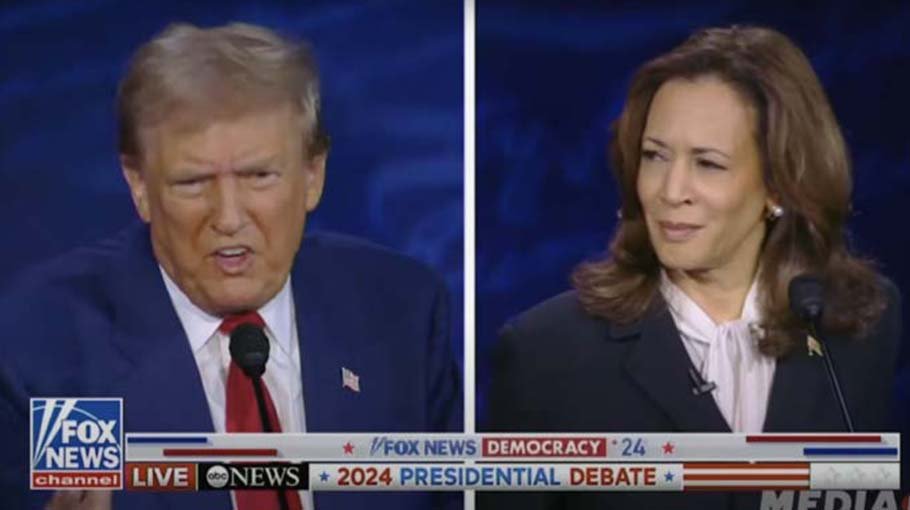The Debate: Catch Trump If You Can

How is it possible that the presidential election remains so close when, at this week’s debate, Donald Trump (R-Felon) warned the nation that, among the millions of illegal aliens laying siege to the American way of life, some in Springfield, Ohio (it’s between Dayton and Columbus), are living on a diet of snatched family pets. Trump ranted:
We’re a failing nation….What they have done to our country by allowing these millions and millions of people to come into our country. And look at what’s happening to the towns all over the United States. And a lot of towns don’t want to talk — not going to be Aurora or Springfield. A lot of towns don’t want to talk about it because they’re so embarrassed by it. In Springfield, they’re eating the dogs. The people that came in. They’re eating the cats. They’re eating — they’re eating the pets of the people that live there. And this is what’s happening in our country. And it’s a shame.
In elections past, bizarre comments of this variety were branded as “gaffs” and often led to the disqualification of the candidate who made them (President Gerald Ford was seen off in 1976 for saying, “There is no Soviet domination of Eastern Europe…”) , but in Trump’s case, the dog-eating allegations caused little more than a ripple in the national conversation—perhaps some fodder for late-night comedians. Then it was back to the straw polls that show Vice President Harris and the narcissistic Trump in a virtual dead heat, the clearest proof we have that presidential politics have descended to the level of a carnival freak show (for which Trump’s embalmers changed his hair color from howler monkey orange to a Baywatch tan).
I am assuming that very few Americans watched all of the debate to learn why Donald Trump or Kamala Harris represents the country’s future.
Most people, I suspect, glanced at headlines, took in a few vlogs from their favorite social media distributor, and came to the conclusion that their candidate of choice prevailed in the marketplace of ideas.
Or they followed a roving camera around the spin rooms and might well have heard Representative Matt Gaetz (R-Underaged) say: “In places like California and the state of Washington, if a parent doesn’t have the right gender-affirming approach to their own children, they’re at risk of losing parental rights.”
The day after, I woke up to the resounding evidence that Harris had floated like a butterfly over the proceedings and occasionally had stung the hapless Trump like a bee. He, I was assured, had done no better on tariffs, Gaza, Ukraine, abortion, climate change, or January 6 than he had with his eloquence over the Springfield protein diet.
Then I re-watched the C-Span feed, including the dismal soundbites from the spin rooms, and came to the conclusion that presidential debates are just a variation on Narcissus’s pond in which we only see our own reflections and hear our own words, which explains why debates rarely move the voting dials.
The location of this presidential debate was Philadelphia’s National Constitution Center, a museum as patriarchal as the original-intent document. Most of the exhibits and cabinets displays are arranged to capture the fleeting imaginations of field-tripping sixth graders (I know, not the worst thing), but the museum fails in its presentation of the document as something set in stone (in this case lots of granite inscriptions from the likes of James Madison), not anything that can evolve with the times.
Today we can thank the flawed language of the Constitution for the failings of the Supreme Court (no term limits were offered, allowing it to become, in its current iteration, Trump’s in-house counsel); the oligarchy of the Senate (in which a majority of the American population gets a minority of the seats); and the absurdity of the electoral college (that routinely elects Republican candidates who have lost the popular vote).
This complaint list doesn’t even take the Constitution to task over its toleration of the slave trade until 1808 or explain how Donald Trump could auction his presidency to foreign governments and still not be booked on emoluments charges.
A presidential debate in the hallowed halls of a “National Constitution Center” is intended to reassure voters that the 2025 Projectionists have yet to seize the radio stations or suspend habeas corpus (perhaps so that during the debate Trump could say with a straight face: “…I have nothing to do with Project 2025. That’s out there. I haven’t read it. I don’t want to read it…”). Note: the Heritage Foundation, which is the author of this Volksgemeinschaft edikt, might well be a wholly-owned subsidiary of the Trump Organization or the Trump-Vance campaign.
The debate itself took place inside a hermetically sealed television studio set up at the Center (it looked like the inside of a mobster’s coffin, as
maybe it was).
Matthew Stevenson is the author of many books, including Reading the Rails, Appalachia Spring, andThe Revolution as a Dinner Party, about China throughout its turbulent twentieth century. His most recent books are Biking with Bismarck and Our Man in Iran.



